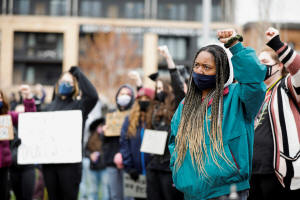Minneapolis, other cities boost security ahead of Chauvin verdict
 Send a link to a friend
Send a link to a friend
 [April 20, 2021]
By Gabriella Borter and Brendan O'Brien [April 20, 2021]
By Gabriella Borter and Brendan O'Brien
(Reuters) - Minneapolis and other U.S.
cities were ramping up security measures on Monday, girding for possible
protests after a jury delivers a verdict in the trial of former
Minneapolis police officer Derek Chauvin, charged with murdering George
Floyd by kneeling on his neck.
Citing the "threat of civil unrest," Minnesota Governor Tim Walz
declared a preemptive state of emergency in the Minneapolis metropolitan
area and requested security assistance from other states. Local officers
were stretched, he said, having policed a week of protests over the
fatal police shooting of a Black man in a Minneapolis suburb and bracing
for more protests over the Chauvin trial verdict.
At a news briefing, Walz said "systemic changes" were necessary to
protect Black Americans but said, "We cannot allow civil unrest to
descend into chaos. We must protect life and property."
A jury began deliberating charges of third and second-degree murder and
second-degree manslaughter against Chauvin after a tense, three-week
trial featuring bystander video of Floyd's fatal arrest that launched a
national anti-racism protest movement last May.

Minneapolis and state officials have heightened security precautions,
girding the courthouse tower with barbed wire and armed soldiers from
the National Guard.
A few miles from the courtroom, nightly protests have flared in Brooklyn
Center, Minnesota, over the police shooting of a 20-year-old Black man,
Daunte Wright, after a routine traffic stop on April 11. Officer
Kimberly Potter turned in her badge on Tuesday, and has been charged
with manslaughter.
Minnesota police were criticized for detaining and pepper-spraying
journalists at Brooklyn Center protests on Friday, and department
leadership responded on Saturday by promising to no longer detain,
threaten or rough up members of the media covering the unrest.
The Minnesota State Patrol also agreed to stop photographing journalists
and their credentials and will no longer order where reporters can
position themselves to cover the demonstrations.
"Following feedback from media, and in light of a recent temporary
restraining order (TRO) filed in federal court, MSP will not photograph
journalists or their credentials," the Minnesota State Patrol statement
said.
It said journalists would be exempt from general dispersal orders issued
to demonstrators, and that state police were banned from using chemical
spray against the press.
The American Civil Liberties Union of Minnesota, which won the
restraining order, said the behavior of some officers "went beyond
unlawful detention to include outright retaliatory assault" against
journalists, whose work to inform the public is protected by the U.S.
Constitution.
[to top of second column]
|

Minneapolis high school students raise their fists after walking out
of class and congregating outside the US Bank Stadium during the
closing statements in the trial of former police officer Derek
Chauvin, who is facing murder charges in the death of George Floyd,
in Minneapolis, Minnesota, U.S., April 19, 2021. REUTERS/Nicholas
Pfosi

CITIES ON ALERT
In Washington D.C., where thousands protested Floyd's death last
June, the National Guard said it was activating about 250 personnel
to help police with street closures in the city ahead of the
verdict.
New York City Police Commissioner Dermot Shea told local media last
week that his department, which critics said cracked down brutally
on protests last spring, had been preparing for the Chauvin trial
verdict and doing "a lot of work" engaging with local leaders,
clergy and community organizations.
"We’re just asking anyone that may come out to voice their concern
over this trial...do it peacefully, no property damage and we’ll get
through it together,” Shea said.
In Chicago, the third-largest U.S. city, the police department said
it deployed additional resources throughout the city including
downtown, and canceled days off for police officers in several units
and teams. Illinois Governor JB Pritzker said he was activating 125
personnel from the state's National Guard to support the city's
police starting Tuesday.
Chicago businesses have boarded up windows in anticipation of
possible unrest, particularly after graphic body-camera video was
released last week showing a Chicago police officer fatally shooting
a 13-year-old Black boy. Chicago saw widespread looting following
Floyd's death last May.
Florida Governor Rick DeSantis, a Republican, on Monday signed an
"anti-riot" bill into law, with tougher penalties for people who
engage in violent protests, noting his expectation of potential
fallout from the Chauvin verdict.

The law enhances penalties for crimes committed during a riot or
violent protest, allowing authorities to detain protesters until
their first court appearance, and establishes new felonies for
organizing a violent protest.
(Reporting by Gabriella Borter, Maria Caspani, Brendan O'Brien,
Idrees Ali, Rich McKay; Editing by David Gregorio)
[© 2021 Thomson Reuters. All rights
reserved.] Copyright 2021 Reuters. All rights reserved. This material may not be published,
broadcast, rewritten or redistributed.
Thompson Reuters is solely responsible for this content. |